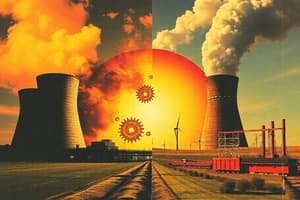Podcast
Questions and Answers
What is the main difference between nuclear fission and nuclear fusion?
What is the main difference between nuclear fission and nuclear fusion?
- Fission involves heavy atoms, while fusion uses light atoms.
- Fission uses protons, while fusion uses neutrons.
- Fission combines atoms, while fusion breaks them apart.
- Fission breaks apart atoms, while fusion combines them. (correct)
Isotopes have the same number of neutrons but different numbers of protons.
Isotopes have the same number of neutrons but different numbers of protons.
False (B)
What two elements are produced when Uranium-235 is broken apart in nuclear fission?
What two elements are produced when Uranium-235 is broken apart in nuclear fission?
krypton-92 and barium-141
The number of protons in an atom's nucleus determines the ______ of the element.
The number of protons in an atom's nucleus determines the ______ of the element.
Match the following terms with their correct definition:
Match the following terms with their correct definition:
What particles are found in an atom?
What particles are found in an atom?
In nuclear fission, the mass of the resulting pieces is greater than the mass of the original atom.
In nuclear fission, the mass of the resulting pieces is greater than the mass of the original atom.
What does the atomic mass number represent?
What does the atomic mass number represent?
What does the variable 'c' represent in the equation E = mc²?
What does the variable 'c' represent in the equation E = mc²?
Nuclear fusion is generally easier to achieve than nuclear fission.
Nuclear fusion is generally easier to achieve than nuclear fission.
What is the result of combining low mass elements such as hydrogen and deuterium?
What is the result of combining low mass elements such as hydrogen and deuterium?
Fission reactors provide useful energy by using _______ as the starting material.
Fission reactors provide useful energy by using _______ as the starting material.
Match the following terms with their definitions:
Match the following terms with their definitions:
Why is it difficult to achieve nuclear fusion?
Why is it difficult to achieve nuclear fusion?
Plutonium can be easily found in nature and is a common starting material for fission.
Plutonium can be easily found in nature and is a common starting material for fission.
In nuclear fission, what happens to uranium-236 after it absorbs a neutron?
In nuclear fission, what happens to uranium-236 after it absorbs a neutron?
Flashcards
Nuclear Fission
Nuclear Fission
A process where a heavy atomic nucleus, like uranium-235, is split into smaller nuclei, releasing energy. This process is used in nuclear power plants to generate electricity.
Nuclear Fusion
Nuclear Fusion
A nuclear reaction where two or more atomic nuclei combine to form one or more different atomic nuclei and subatomic particles (neutrons or protons). This process releases a tremendous amount of energy.
Mass-energy Conversion
Mass-energy Conversion
A process where a large object is broken down into smaller pieces, resulting in a decrease in mass, which is converted into energy.
Atomic Number
Atomic Number
Signup and view all the flashcards
Atomic Mass Number
Atomic Mass Number
Signup and view all the flashcards
Isotopes
Isotopes
Signup and view all the flashcards
Nuclear Chain Reaction
Nuclear Chain Reaction
Signup and view all the flashcards
Nuclear Power
Nuclear Power
Signup and view all the flashcards
Einstein's Famous Equation
Einstein's Famous Equation
Signup and view all the flashcards
Why is Fusion Difficult?
Why is Fusion Difficult?
Signup and view all the flashcards
Why is Fusion Better than Fission?
Why is Fusion Better than Fission?
Signup and view all the flashcards
How Does Fission Work?
How Does Fission Work?
Signup and view all the flashcards
Challenges with Fission Material
Challenges with Fission Material
Signup and view all the flashcards
Nuclear Power Plants
Nuclear Power Plants
Signup and view all the flashcards
Study Notes
Nuclear Fission vs. Fusion
- Nuclear fission involves splitting heavy atoms (like uranium) to release energy.
- Nuclear fusion involves combining light atoms (like hydrogen) to release energy.
- Fission is relatively simpler to achieve than fusion.
- Fusion requires extremely high temperatures and pressures to overcome the electrostatic repulsion between positively charged nuclei.
- Fission byproducts can be radioactive and chemically active, posing handling challenges.
- Fusion products (like helium) are generally less radioactive and safer.
- Fission reactors already exist and are producing energy.
- Fusion reactors are not yet operational on a large, practical scale.
Nuclear Fusion Research
- Recent announcements highlight progress in fusion reactor development.
- Lockheed Martin announced plans for a truck-sized fusion reactor.
- German physicists are close to completing another fusion reactor project.
Key Differences
- Fission involves splitting atoms; fusion involves combining them.
- Fission produces more mass than the original combined product (loss of mass is converted to energy). This is related to Einstein's famous equation E=mc².
- Fusion reactor startup (General Fusion) focuses on the nuclear part. There is a big difference between nuclear fission and nuclear fusion.
Mass-Energy Relationship
- A small difference in mass between reactants and products in a nuclear reaction results in a vast release of energy.
- The missing mass is converted into usable energy (E=mc²).
Studying That Suits You
Use AI to generate personalized quizzes and flashcards to suit your learning preferences.




